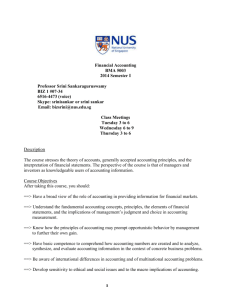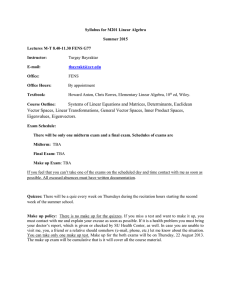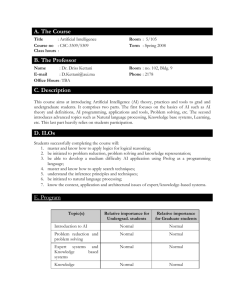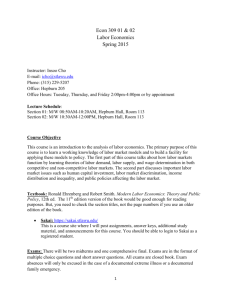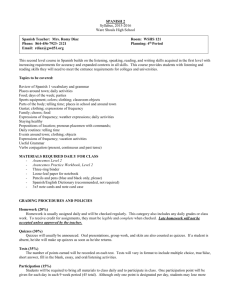Financial Accounting - NUS Business School
advertisement
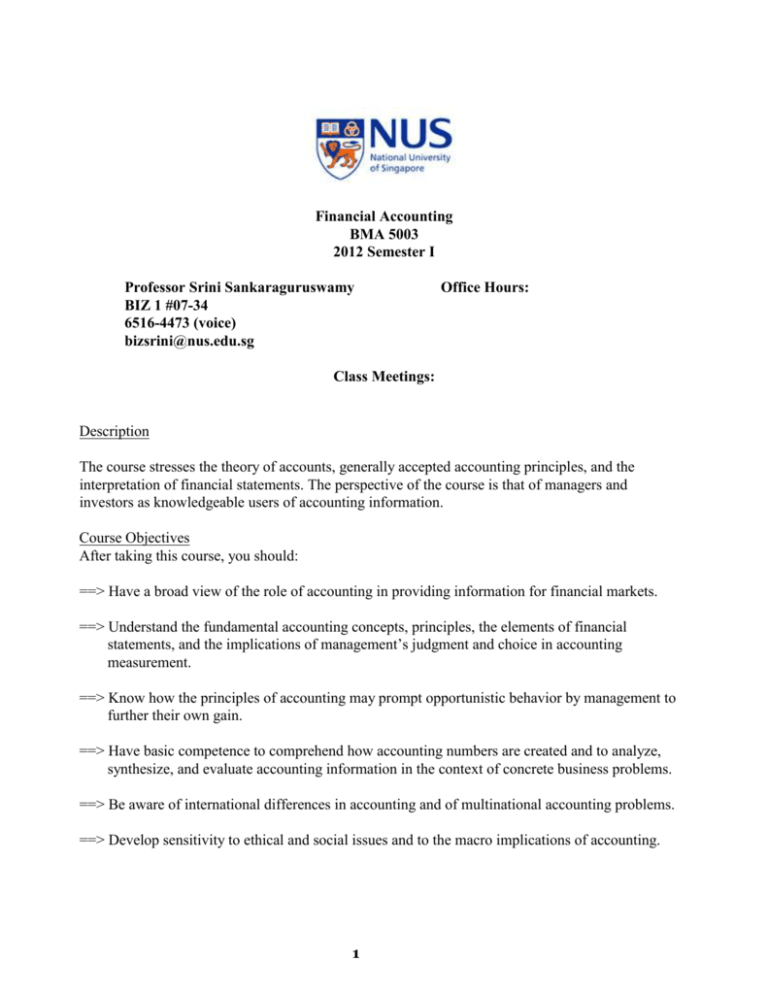
Financial Accounting BMA 5003 2012 Semester I Professor Srini Sankaraguruswamy BIZ 1 #07-34 6516-4473 (voice) bizsrini@nus.edu.sg Office Hours: Class Meetings: Description The course stresses the theory of accounts, generally accepted accounting principles, and the interpretation of financial statements. The perspective of the course is that of managers and investors as knowledgeable users of accounting information. Course Objectives After taking this course, you should: ==> Have a broad view of the role of accounting in providing information for financial markets. ==> Understand the fundamental accounting concepts, principles, the elements of financial statements, and the implications of management’s judgment and choice in accounting measurement. ==> Know how the principles of accounting may prompt opportunistic behavior by management to further their own gain. ==> Have basic competence to comprehend how accounting numbers are created and to analyze, synthesize, and evaluate accounting information in the context of concrete business problems. ==> Be aware of international differences in accounting and of multinational accounting problems. ==> Develop sensitivity to ethical and social issues and to the macro implications of accounting. 1 Pedagogical Notes The objectives of the course are achieved through a combination of lectures, discussion, problem solving, reading, and financial analysis projects. I want to stress from the outset that this is a challenging course. It is also enjoyable and rewarding. I have planned the different elements of the course keeping in mind that I want to get a graduate student with a rudimentary or no knowledge of basic accounting to a level that will make her or him competitive in an increasingly global environment. This is a challenging but attainable goal. Remember that accounting is cumulative. It can best be learned incrementally and gradually. It cannot be learned all at once. Experience shows that best learning results can be achieved by keeping up with new material and concepts as they are introduced and by mastering each major new concept before proceeding to the next. Experience also shows that class lecture/discussion can be effective only if the topics have been reviewed beforehand. So here are a few simple steps you should follow: (1) read the assigned chapter and related class notes and attempt some of the assigned problems before the topic is discussed in class, (2) participate in class discussion to clarify the issues that were not clear enough when you first read the chapter or class notes, and (3) read the chapter and class notes again after class and attempt a few more problems. Also remember that correct answers to problems are less essential than studying and comprehending the issues and concepts to gain familiarity with underlying objectives of financial reporting. Class discussion of problems, collaborative and individual work, research, and analysis are essential for gaining proficiency and communicating your thoughts and ideas to others. Only through constant reinforcement, questions and answers and individual reflection will it be possible to gain a sufficient level of comfort in a short period of time. Text and Collateral Readings Lecture notes, assignments, and past exams will be posted periodically on IVLE. Please check IVLE regularly for new material. The Asian Wall Street Journal is recommended, a few minutes reading every day. Useful Websites ==> Securities and Exchange Commission filings: www.sec.gov. Select EDGAR for company data. This is the main site for company annual reports (10-Ks) and quarterly reports (10-Qs). ==> FASB website for financial accounting standards: www.fasb.org. IASC website for international financial accounting standards: www.iasc.org.uk Business times Singapore www.businesstimes.com.sg (Available on NUS Library web site) Assignments and Examinations A tentative schedule of assignments is attached. Any changes will be announced in class. Quizzes and Examinations There will be four quizzes, a midterm and a final examination. All of the quizzes and exams will 2 be cumulative and closed book. This is mainly because the concepts and topics in this course are so basic and important for your career, including interviews and internships, that it is imperative to know them without having to resort to books and notes. Copies of past exams will be posted on IVLE. The quizzes will count for 10 points, the midterm will count for 25 points, and the final examination will count for 35 points. Crunchy Cones The goal of the project is to develop projected financial statements for a new business. Separate instructions for the project will be distributed. This project will count for 5 points of your grade. Annual Report Project For this project, you will work with a group. You will select two publicly traded companies from the same industry. You are expected to become an “expert” on your companies and contribute that knowledge to class discussion. You are also required to complete a written end-of-semester group report that analyzes the companies’ financials and accounting and disclosure policies. The project is due the last day of classes. It will count for 10 points. Cases We will study 5 cases during the course. These cases are group effort and your group will submit a write up on the case before the class starts. The cases will be discussed in class by group and I will call upon all or any groups to discuss parts of the case. Grade Determination Your grade will be based on the following: Quizzes Midterm Final Exam Crunchy Cones Project Cases Annual Report Project Participation points points points points points points points 100 points Policy on Class Attendance Students are responsible for adhering to all course procedures and policies, including class attendance, set down by an instructor for the successful completion of a course; absence from class for whatever reason carries with it the obligation of making up missed work. 3
